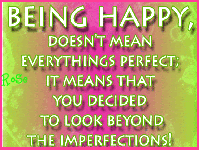
How do we become part of the solution, in these times, without being part of the problem?
What are we doing to be a problem? I suspect that whining and complaining about the challenges we face are both part of the problem and an irritant, especially when we have nothing to contribute or to help improve the situation. What do you think?
Being part of the problem does not help anyone, it just makes things more difficult to handle. Being overly positive about things will only irritate people around us and make them want to scream, so that isn't being the solution either.
Writing to our Representatives and telling them how mad we are at them will not make them want to do what we want! Telling them that we appreciate what they do for us and that we will be glad to re-elect them if they start voting the way the majority wants won't work either. While they may appreciate the compliment, threatening them will not influence them to do a thing for us. What we need to do is tell our representatives how we feel about an issue and why we feel the way we do, and then ask them to consider our views when they vote.
I assure you, I had not been that positive when writing to my representatives in the past, but I have changed. Now I consider the stress of their work and the pressure they are under when voting a specific way. I never considered their positions before, because I want what I want and they aren't giving it to me. Sound familiar?
We can't changed anything when all we do is complain and offer no answers or suggestions. Although we may have no idea of how to change things we object to, we can at least tell those in power how we feel and ask them what they can do to resolve our concerns.
Problems don't go away on their own, they get resolved through negotiations or by default. Do we want the problems we face to be resolved through default because no one objected or gave suggestions? I'm one who believes being proactive is more satisfying than letting life happen to us.
For instance, my son was in a Counsel Meeting when he objected to some money being given away to an organization. He mentioned that the money was not theirs to give and that doing so was an abuse of their responsibilities as a counsel member.
After my son finished explaining how he felt about giving away property worth $450,000, he received a standing ovation for his remarks. The Counsel decided to vote against giving away the property to that organization. When the meeting convened, many people came up and thanked him for saying what he did and said they agreed with him.
One person changed the mind of the entire Counsel by opening his mouth and telling them what he thought, along with giving them a good reason for voting against it. He appropriately used his power of persuasion to influence the right decision in the matter. If he had not spoken up, the Counsel would have made a mistake and abused their position of responsibility in representing the people of their city.
On the other hand, my son could have been silent or he could have been insulting and demanding about his position and no one would have listened to him. In fact, they would have probably escorted him from the meeting. In this way, my son became part of the solution instead of a problem.
Let us all find a better way to communicate our wishes to our representatives and use our power of persuasion to influence a change. Perhaps they will accept our position, and perhaps they won't. All we can do is try. We may never know what affect we have on someone, but for sure, we will have no affect if we keep our mouth shut.
Our representatives need to know that their constituents are paying attention to them and that we will influence their re-election next term. Then they will pay more heed to meeting the needs of those they know are watching them.
Now, do you see how these same principles can apply to your family and social conflicts? Do you see how to use these techniques to improve your concerns in all aspects of your life? Becoming the solution instead of the problem improves life in so many ways.
I would be interested in hearing your stories and how you succeeded in applying these principles. I sure there must be many stories like my son's. I hope you will share them with us.









No comments:
Post a Comment